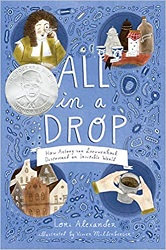How Antony van Leeuwenhoek Discovered an Invisible World
by Lori Alexander
illustrated by Vivien Mildenberger
Houghton Mifflin Harcourt, 2019. 93 pages.
Review written April 2, 2020, from a library book
Starred Review
2020 Robert F. Sibert Award Honor
This book is about the man who discovered that there were tiny organisms in drops of water. And what surprised me is that even the members of the Royal Society in London didn’t believe him for a whole year after his report.
Born in 1632 in the Netherlands, Antony van Leeuwenhoek never studied science, and he became a draper, a seller of cloth. But to examine cloth closely, they used magnifying lenses. After a trip to London, where he saw a book about a new invention called a microscope, Antony decided to make one himself.
What fascinated me is that Antony didn’t make just one microscope and then look at many different things. Instead, he’d glue his specimens to a base, and then make a new microscope to look at that thing. He devised a system, and he’d shape the glass and screw the lenses into focus. They ended up being the best microscopes in the world at the time.
And Antony proceeded to make discoveries. He discovered that insects didn’t spontaneously generate, as was thought at the time. And he found “little animals” in rivers and streams and also in people’s mouths. In fact, he made discoveries in many different fields of science without ever being trained as a scientist, but simply a curious person.
I love it when I read a children’s book and learn about someone I knew nothing about. This short chapter book is full of fascinating information and tells about a man who changed the way we see the world.
lorialexanderbooks.com
vivien.mildenberger.com
This review is only on the blog.
Disclosure: I am an Amazon Affiliate, and will earn a small percentage if you order a book on Amazon after clicking through from my site.
Source: This review is based on a library book from Fairfax County Public Library.
Disclaimer: I am a professional librarian, but the views expressed are solely my own, and in no way represent the official views of my employer or of any committee or group of which I am part.
What did you think of this book?
